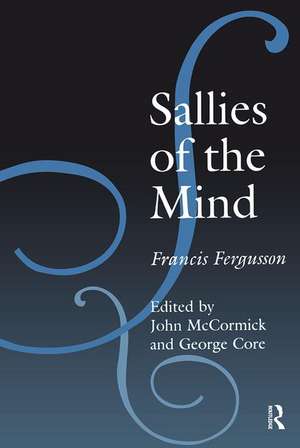Sallies of the Mind
Autor Francis Fergussonen Limba Engleză Paperback – 16 apr 2018
Sallies of the Mind is a collection of Fergusson's essays drawn from a variety of virtually unattainable works. It incorporates Fergusson's representative criticism on such major authors as Dante, Shakespeare, James, and Eliot; on myths as well as action; on the modern stage; and on the modern novel. Essays in this collection include: "T.S. Eliot and His Impersonal Theory of Art" "Humanism" "Maritain's Creative Intuition" "Two Perspectives on European Literature" "Two Acts from Dante's Drama of the Mind" "The Divine Comedy as a Bridge across Time" "Hamlet" "Measure for Measure" "Eugene O'Neill" "Exiles and Ibsen's Work" "Oedipus According to Freud, Sophocles, and Freud" "The Theater of Paul Valery" "D.H. Lawrence's Sensibility" and "The Drama in The Golden Bowl."
Francis Fergusson's criticism endures not only owing to its originality, depth, and range but also to its classically austere clarity of style. Looking at the present-day critical scene, we see few who match Fergusson's intelligence, learning, and verve. Sallies of the Mind is a tribute to his legacy as well as to the themes he treats.
| Toate formatele și edițiile | Preț | Express |
|---|---|---|
| Paperback (1) | 382.87 lei 43-57 zile | |
| Taylor & Francis – 16 apr 2018 | 382.87 lei 43-57 zile | |
| Hardback (1) | 988.03 lei 43-57 zile | |
| Taylor & Francis – 30 ian 1997 | 988.03 lei 43-57 zile |
Preț: 382.87 lei
Nou
Puncte Express: 574
Preț estimativ în valută:
73.30€ • 75.38$ • 60.81£
73.30€ • 75.38$ • 60.81£
Carte tipărită la comandă
Livrare economică 17 februarie-03 martie
Preluare comenzi: 021 569.72.76
Specificații
ISBN-13: 9781138514355
ISBN-10: 1138514357
Pagini: 268
Dimensiuni: 152 x 229 x 14 mm
Greutate: 0.45 kg
Ediția:1
Editura: Taylor & Francis
Colecția Routledge
Locul publicării:Oxford, United Kingdom
ISBN-10: 1138514357
Pagini: 268
Dimensiuni: 152 x 229 x 14 mm
Greutate: 0.45 kg
Ediția:1
Editura: Taylor & Francis
Colecția Routledge
Locul publicării:Oxford, United Kingdom
Cuprins
I. 1. T. S. Eliot and His Impersonal Theory of Art (1927) 2. Humanism (1930) 3. Maritain’s Creative Intuition (1963) II 4. Two Perspectives on European Literature (1954) 5. Two Acts from Dante’s Drama of the Mind (1951) 6. The Divine Comedy as a Bridge across Time (1965) III 7. Prince of Denmark: The Analogy of Action (1940) 8. Human Government: Purgatorio 16 and Measure for Measure (1951) 9. Belief and Make-Believe: Poetry as Evidence of Things Not Seen (1973) IV 10. Eugene O’Neill (1930) 11. Exiles and Ibsen’s Work (1932) 12. T. S. Eliot’s Poetry and Drama (1952) 13. On the Edge of Broadway (1954) 14. The Theater of Paul Valéry (1960) 15. Oedipus According to Freud, Sophocles, and Cocteau (1975) V 16. D. H. Lawrence’s Sensibility (1933) 17. The Drama in The Golden Bowl (1934) 18. Three Novels (1954) VI 19. “Myth” and the Literary Scruple (1956) 20. The Notion of “Action” (1964)
Descriere
Violation of the rights of a human being and indifference in the face of suffering jeopardize the very existence of human society. The Holocaust is the most extreme example of such violations, and the greatest moral failure mankind has experienced. Confronting the Holocaust, as well as genocide, may contribute to understanding the importance of humanistic and democratic values, and help construct tools for making moral judgments. That is why courses on the study of genocide and the Holocaust have become part of the curricula of educational institutions in the United States and elsewhere. This book asks how the moral messages of the Holocaust and genocide can best be transmitted. The Pain of Knowledge deals not with historical events, but with possible ways of learning about these events and their significance. It attempts to examine and deal critically with some of the profound dilemmas at the core of Holocaust and genocide issues in education. The underlying purpose of this book is to expose the reader to sometimes antithetical, and at other times complementary, views concerning the teaching of these subjects, both in Israel and elsewhere in the world. This book will contribute to the teaching of the Holocaust and genocide, and encourage readers to examine these issues from a broad perspective. Among the subjects dealt with in The Pain of Knowledge are: how societies crystallize their collective memories; historical processes and changes in the teaching of the Holocaust in Israel during different periods of time; commemoration of Holocaust Martyrs and Heroes Remembrance Day; journeys of Israeli youth to sites connected with the Holocaust in Poland; attitudes of Israeli adolescents toward the Holocaust; attitudes of Israeli Arabs toward the Holocaust; general world attitudes toward the Holocaust; teaching of the Holocaust throughout the world; and teaching of genocide in Israel and elsewhere. Yair Auron is senior lecturer at The Open University





